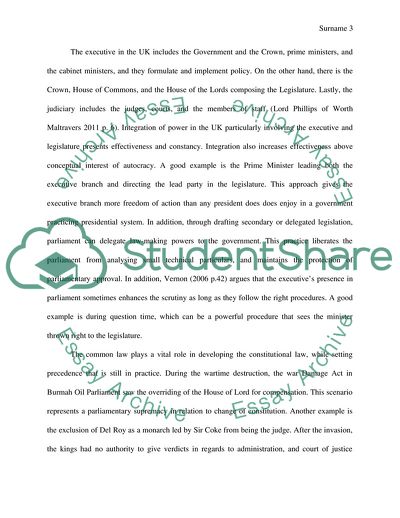Cite this document
(Separation of Powers in the UK Essay Example | Topics and Well Written Essays - 1500 words, n.d.)
Separation of Powers in the UK Essay Example | Topics and Well Written Essays - 1500 words. https://studentshare.org/law/1856127-title-the-important-question-is-not-whether-the-uk-adheres-to-a-pure-conception-of-the-separation-of-powers-but-whether-its-institutions-of-government-are-organised-in-such-a-way-as-to-guard-satisfactorily-against-the-abuse-of-power-elliott
Separation of Powers in the UK Essay Example | Topics and Well Written Essays - 1500 words. https://studentshare.org/law/1856127-title-the-important-question-is-not-whether-the-uk-adheres-to-a-pure-conception-of-the-separation-of-powers-but-whether-its-institutions-of-government-are-organised-in-such-a-way-as-to-guard-satisfactorily-against-the-abuse-of-power-elliott
(Separation of Powers in the UK Essay Example | Topics and Well Written Essays - 1500 Words)
Separation of Powers in the UK Essay Example | Topics and Well Written Essays - 1500 Words. https://studentshare.org/law/1856127-title-the-important-question-is-not-whether-the-uk-adheres-to-a-pure-conception-of-the-separation-of-powers-but-whether-its-institutions-of-government-are-organised-in-such-a-way-as-to-guard-satisfactorily-against-the-abuse-of-power-elliott.
Separation of Powers in the UK Essay Example | Topics and Well Written Essays - 1500 Words. https://studentshare.org/law/1856127-title-the-important-question-is-not-whether-the-uk-adheres-to-a-pure-conception-of-the-separation-of-powers-but-whether-its-institutions-of-government-are-organised-in-such-a-way-as-to-guard-satisfactorily-against-the-abuse-of-power-elliott.
“Separation of Powers in the UK Essay Example | Topics and Well Written Essays - 1500 Words”. https://studentshare.org/law/1856127-title-the-important-question-is-not-whether-the-uk-adheres-to-a-pure-conception-of-the-separation-of-powers-but-whether-its-institutions-of-government-are-organised-in-such-a-way-as-to-guard-satisfactorily-against-the-abuse-of-power-elliott.


